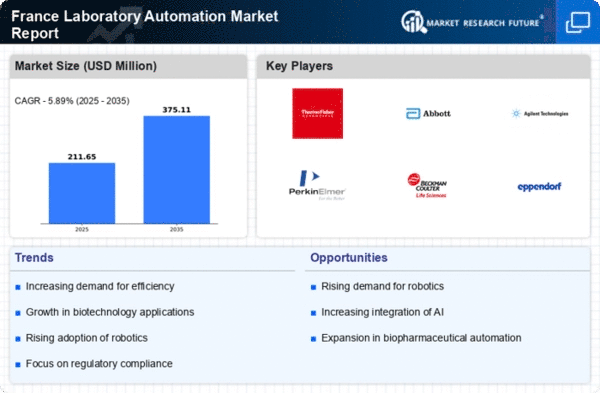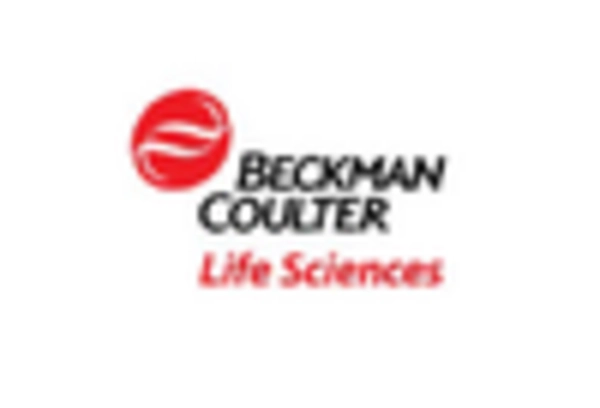Rising Focus on Cost Efficiency
Cost efficiency remains a pivotal driver in the laboratory automation market in France. Laboratories are increasingly seeking automation solutions that can streamline operations and reduce operational costs. By automating repetitive tasks, laboratories can allocate resources more effectively, leading to significant savings in labor costs and time. The potential for increased throughput and reduced turnaround times further enhances the appeal of automation. According to recent estimates, laboratories that implement automation can achieve cost reductions of up to 30%. This focus on cost efficiency is likely to propel the growth of the laboratory automation market as organizations strive to optimize their budgets while maintaining high-quality standards.
Technological Advancements in Robotics
The laboratory automation market in France is experiencing a surge due to rapid advancements in robotics technology. Innovations in robotic systems enhance precision and efficiency in laboratory processes, which is crucial for research and diagnostics. The integration of sophisticated robotic arms and automated systems allows laboratories to perform complex tasks with minimal human intervention. This shift not only reduces the likelihood of human error but also accelerates the pace of research. As a result, the market is projected to grow at a CAGR of approximately 10% over the next five years. The increasing adoption of robotics in laboratories is likely to drive the demand for automation solutions, thereby transforming the landscape of the laboratory automation market.
Emphasis on Customization and Flexibility
Customization and flexibility are emerging as key drivers in the laboratory automation market in France. Laboratories often have unique workflows and requirements, necessitating tailored automation solutions. Vendors are increasingly offering customizable systems that can adapt to specific laboratory needs, enhancing user satisfaction and operational efficiency. This trend is particularly evident in sectors such as clinical diagnostics and research, where diverse applications demand versatile automation solutions. The ability to modify automation systems to fit various laboratory environments is likely to foster greater adoption, thereby contributing to the growth of the laboratory automation market. As laboratories seek solutions that align with their specific processes, the demand for flexible automation options is expected to rise.
Growing Demand for Data Management Solutions
The laboratory automation market in France is witnessing a growing demand for advanced data management solutions. As laboratories generate vast amounts of data, the need for efficient data handling and analysis becomes paramount. Automation systems equipped with robust data management capabilities enable laboratories to store, analyze, and retrieve data seamlessly. This trend is particularly relevant in fields such as pharmaceuticals and biotechnology, where data integrity and compliance with regulatory standards are critical. The market for data management solutions within laboratory automation is expected to expand significantly, with projections indicating a growth rate of around 12% annually. This increasing demand underscores the importance of integrating data management into the laboratory automation market.
Increased Investment in Research and Development
Investment in research and development (R&D) is a significant driver of the laboratory automation market in France. The government and private sectors are channeling substantial funds into R&D initiatives, particularly in life sciences and healthcare. This influx of investment is fostering innovation and the development of advanced automation technologies. As laboratories strive to enhance their capabilities and improve research outcomes, the demand for automation solutions is likely to increase. Recent reports indicate that R&D spending in France has risen by approximately 5% annually, reflecting a commitment to advancing scientific research. This trend is expected to bolster the laboratory automation market as organizations seek to leverage automation to support their R&D efforts.

















